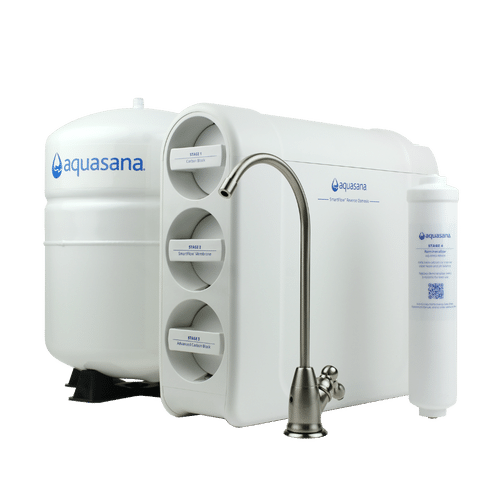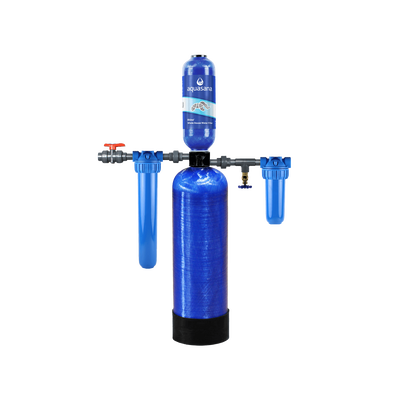What is TDS?
First, it’s important to know what TDS really is: Total Dissolved Solids. TDS in water refers to the amount of total dissolved solids in your tap water.
After water falls to the ground as rain, it dissolves the minerals present in the rocks and soil it passes over or through. As it dissolves these minerals, they remain in the water at varying levels of concentration. This is a very natural process and it helps make water taste “right” by slightly raising the pH of the water. The most common minerals found in water are calcium, magnesium, and sodium.
Some areas of the country have higher levels of these dissolved minerals in their water making it “hard” and other areas have lower levels. According to the Water Quality Association, water in the 120 mg/L (or ppm) and above range is considered hard, with 180 mg/L being considered very hard. Water in the 80 to 100 mg/L range is ideal, meaning it’s not too hard and has the right amount of dissolved minerals for optimal taste. As the TDS level goes below 17 mg/L, (as the minerals are removed) it becomes “soft”, with a lower pH and more acidity.
In addition to inorganic materials like minerals, TDS also features a small amount of organic material from sources such as leaves, sewage, and waste as well.
What is a TDS meter?
A TDS meter is a small hand-held device used to indicate the Total Dissolved Solids in a solution, usually water. Since dissolved ionized solids, such as salts and minerals, increase the conductivity of a solution, a TDS meter measures the conductivity of the solution and estimates the TDS from that reading.
TDS meters may be referred to as TDS testers or PPM (parts per million) testers, but all of these are different names for the same thing. TDS meters can be purchased for as low as $10, but more advanced models can cost $1,000+ based on the level of accuracy and additional features offered.
For example, a basic TDS meter may only measure the amount of total dissolved solids in a solution while an advanced model may be able to check salinity, temperature, and more.

Why should you measure TDS?
A high TDS level means you have an abundance of dissolved solids in your water, which typically includes minerals. Over time, the constant presence of these minerals in your water can lead to scale buildup in your pipes and appliances which shortens their lifespan and effectiveness. By knowing your TDS level, you can determine whether you need something to combat this issue, like a Salt-Free Water Conditioner or a water softener for, especially hard water.
Salt-Free Water Conditioners inhibit scale buildup by transforming dissolved hard minerals into harmless, microscopic crystals that don’t accumulate over time. Water softeners remove hard water minerals from water through a process called ion exchange, where hard mineral ions in tap water get swapped for harmless sodium ions in a softener's resin beads. Keep in mind, both types of systems are different than a water filter. Water filters are designed to tackle chemical and viral contaminants, while softeners and conditioners focus on hard water minerals including those associated with TDS.
What does a TDS meter not measure?
A TDS meter does not measure contaminants. It will not tell you if your water is healthy. The TDS meter reading simply refers to the amount of total dissolved solids in your water, it will not tell you what those solids actually are and if they are harmful for your health.
For example, you could have a high TDS meter reading but no harmful contaminants in your water. Some healthy minerals like potassium, magnesium, and calcium can actually cause your TDS meter to spike. So, any water filter with a remineralizer could cause a high reading on your TDS meter, even though the remineralizer is adding good minerals that you want.
On the other hand, you could have a low TDS level even if several harmful contaminants are present in your drinking water. Your water could have heavy metals like lead, or other contaminants like pesticides, pharmaceuticals, or hexavalent chromium. The TDS meter will not pick these contaminants up.
This is why you shouldn’t rely on a TDS meter to determine your water quality. You need to understand not just how many dissolved solids are in your water, but what those solids are and if they’re harmful for your health.
Do you need a TDS meter or a water testing kit?
When considering water filtration, the short answer is: no – you do not need a TDS meter or a water testing kit because you can get a much better report from your water supplier. As part of the 1998 Safe Drinking Water Act, community water systems are legally required to send you a detailed report of what’s in your water. These water quality reports will tell you far more about what’s in your water than you’d be able to test for with a TDS meter or basic water testing kit. To request your water quality report, check your water supplier’s website or contact them for more information. Once you have it, check out our guide on How to Interpret Your Water Quality Report so you can understand what you’re looking at and determine if you need a water filter.

Does a high TDS meter reading mean you need a water filter?
To summarize, your TDS meter reading is simply a quantitative measure of the amount of dissolved solids in your water, it is not a qualitative measure indicating what those substances are and whether they are harmful. Your TDS level can be used to determine if you need a Salt-Free Water Conditioner to prevent scale buildup from mineral accumulation in pipes and appliances, but you should not rely on your water’s TDS alone to decide whether you need a water filter.
To decide whether you need a water filter for your home, your best option is to request a detailed water quality report from your local water supplier. If there are contaminants in your water, knowing which ones are present will help you choose a water filter for your home.
When choosing a water filter, the goal should not be to remove all TDS because some of these are healthy minerals that contribute to a good taste for your drinking water. All Aquasana drinking water filters utilize Claryum® selective filtration technology to remove harmful contaminants while retaining healthy minerals such as calcium, magnesium, and potassium.
To remove the most contaminants, you'll want to look at reverse osmosis water filters. However, some of these RO filters actually remove too many minerals, so make sure to purchase one with remineralization technology like our SmartFlow® Reverse Osmosis. There are many under sink or countertop water filter options, offerings various levels of filtration power depending on what contaminants you need to address. While each of the options above offer filtered water in a specific area where they're installed, if you want filtered water throughout your entire home we recommend a whole house water filtration system.
For additional information about TDS and water filters, contact us and we'll answer your questions.
UNDER SINK WATER FILTER
SmartFlow® Reverse Osmosis
High-efficiency reverse osmosis system removes up to 99.99% of 90 contaminants, including fluoride, arsenic, chlorine, and lead.



